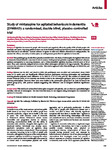Study of mirtazapine for agitated behaviours in dementia (SYMBAD): a randomised, double-blind, placebo-controlled trial
| dc.contributor.author | Banerjee, Sube | |
| dc.contributor.author | High, J | |
| dc.contributor.author | Stirling, S | |
| dc.contributor.author | Shepstone, L | |
| dc.contributor.author | Swart, AM | |
| dc.contributor.author | Telling, T | |
| dc.contributor.author | Henderson, C | |
| dc.contributor.author | Ballard, C | |
| dc.contributor.author | Bentham, P | |
| dc.contributor.author | Burns, A | |
| dc.contributor.author | Farina, Nicolas | |
| dc.contributor.author | Fox, C | |
| dc.contributor.author | Francis, P | |
| dc.contributor.author | Howard, R | |
| dc.contributor.author | Knapp, M | |
| dc.contributor.author | Leroi, I | |
| dc.contributor.author | Livingston, G | |
| dc.contributor.author | Nilforooshan, R | |
| dc.contributor.author | Nurock, S | |
| dc.contributor.author | O'Brien, J | |
| dc.contributor.author | Price, A | |
| dc.contributor.author | Thomas, AJ | |
| dc.contributor.author | Tabet, N | |
| dc.date.accessioned | 2022-03-04T09:49:37Z | |
| dc.date.issued | 2021-10-21 | |
| dc.identifier.issn | 0140-6736 | |
| dc.identifier.issn | 1474-547X | |
| dc.identifier.uri | http://hdl.handle.net/10026.1/18877 | |
| dc.description.abstract |
BACKGROUND: Agitation is common in people with dementia and negatively affects the quality of life of both people with dementia and carers. Non-drug patient-centred care is the first-line treatment, but there is a need for other treatment when this care is not effective. Current evidence is sparse on safer and effective alternatives to antipsychotics. We assessed the efficacy and safety of mirtazapine, an antidepressant prescribed for agitation in dementia. METHODS: This parallel-group, double-blind, placebo-controlled trial-the Study of Mirtazapine for Agitated Behaviours in Dementia trial (SYMBAD)-was done in 26 UK centres. Participants had probable or possible Alzheimer's disease, agitation unresponsive to non-drug treatment, and a Cohen-Mansfield Agitation Inventory (CMAI) score of 45 or more. They were randomly assigned (1:1) to receive either mirtazapine (titrated to 45 mg) or placebo. The primary outcome was reduction in CMAI score at 12 weeks. This trial is registered with ClinicalTrials.gov, NCT03031184, and ISRCTN17411897. FINDINGS: Between Jan 26, 2017, and March 6, 2020, 204 participants were recruited and randomised. Mean CMAI scores at 12 weeks were not significantly different between participants receiving mirtazapine and participants receiving placebo (adjusted mean difference -1·74, 95% CI -7·17 to 3·69; p=0·53). The number of controls with adverse events (65 [64%] of 102 controls) was similar to that in the mirtazapine group (67 [66%] of 102 participants receiving mirtazapine). However, there were more deaths in the mirtazapine group (n=7) by week 16 than in the control group (n=1), with post-hoc analysis suggesting this difference was of marginal statistical significance (p=0·065). INTERPRETATION: This trial found no benefit of mirtazapine compared with placebo, and we observed a potentially higher mortality with use of mirtazapine. The data from this study do not support using mirtazapine as a treatment for agitation in dementia. FUNDING: UK National Institute for Health Research Health Technology Assessment Programme. | |
| dc.format.extent | 1487-1497 | |
| dc.format.medium | ||
| dc.language | en | |
| dc.language.iso | en | |
| dc.publisher | Elsevier | |
| dc.subject | Aged, 80 and over | |
| dc.subject | Anti-Anxiety Agents | |
| dc.subject | Brief Psychiatric Rating Scale | |
| dc.subject | Caregivers | |
| dc.subject | Dementia | |
| dc.subject | Double-Blind Method | |
| dc.subject | Female | |
| dc.subject | Humans | |
| dc.subject | Male | |
| dc.subject | Mirtazapine | |
| dc.subject | Psychomotor Agitation | |
| dc.subject | Quality of Life | |
| dc.subject | United Kingdom | |
| dc.title | Study of mirtazapine for agitated behaviours in dementia (SYMBAD): a randomised, double-blind, placebo-controlled trial | |
| dc.type | journal-article | |
| dc.type | Journal Article | |
| dc.type | Randomized Controlled Trial | |
| plymouth.author-url | https://www.webofscience.com/api/gateway?GWVersion=2&SrcApp=PARTNER_APP&SrcAuth=LinksAMR&KeyUT=WOS:000710725800022&DestLinkType=FullRecord&DestApp=ALL_WOS&UsrCustomerID=11bb513d99f797142bcfeffcc58ea008 | |
| plymouth.issue | 10310 | |
| plymouth.volume | 398 | |
| plymouth.publication-status | Published | |
| plymouth.journal | The Lancet | |
| dc.identifier.doi | 10.1016/s0140-6736(21)01210-1 | |
| plymouth.organisational-group | /Plymouth | |
| plymouth.organisational-group | /Plymouth/Faculty of Health | |
| plymouth.organisational-group | /Plymouth/Faculty of Health/Peninsula Medical School | |
| plymouth.organisational-group | /Plymouth/Faculty of Health/Peninsula Medical School/PMS - Manual | |
| plymouth.organisational-group | /Plymouth/REF 2021 Researchers by UoA | |
| plymouth.organisational-group | /Plymouth/REF 2021 Researchers by UoA/UoA03 Allied Health Professions, Dentistry, Nursing and Pharmacy | |
| plymouth.organisational-group | /Plymouth/Users by role | |
| plymouth.organisational-group | /Plymouth/Users by role/Academics | |
| plymouth.organisational-group | /Plymouth/Users by role/Researchers in ResearchFish submission | |
| dc.publisher.place | England | |
| dcterms.dateAccepted | 2021-07-30 | |
| dc.rights.embargodate | 2022-3-8 | |
| dc.identifier.eissn | 1474-547X | |
| dc.rights.embargoperiod | Not known | |
| rioxxterms.versionofrecord | 10.1016/s0140-6736(21)01210-1 | |
| rioxxterms.licenseref.uri | http://www.rioxx.net/licenses/all-rights-reserved | |
| rioxxterms.licenseref.startdate | 2021-10-21 | |
| rioxxterms.type | Journal Article/Review |


